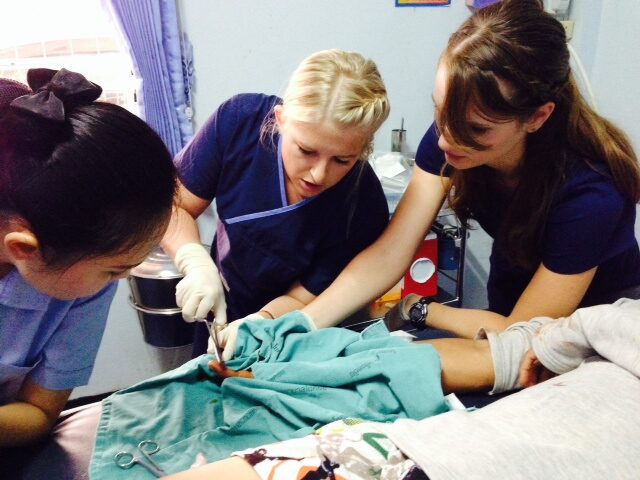
It didn’t take long for the group from the University of Michigan School of Nursing (UMSN) to get a global health experience. During their October flight to Thailand, a passenger became unresponsive with a slowing heartbeat and excessive sweating. Limited resources and a language barrier added complexity, but with the woman’s family and flight attendants helping translate, and the UMSN team was able to stabilize the woman.
The five students from the school’s primary care nurse practitioner program were led by Clinical Assistant Professors Michelle Pardee and April Bigelow.
“We have been exploring the possibilities for international clinical rotations for some time,” says Bigelow. “The opportunity to pilot an international experience in Thailand was a great fit given our strong relationship with several universities and the Ministry of Public Health.”
“From the beginning of the trip, the students wholeheartedly jumped into the experience, which made it an amazing adventure,” Pardee said.
Once in Thailand, the group was based at Suranaree University of Technology (SUT). The head of SUT’s Community Health Nursing program, Naruemol Singha-Dong, is a UMSN MS and Ph.D. alumna and clinical adjunct faculty member. She assisted the UMSN group with arranging everything from clinicals to excursions. “Dr. Singha-Dong facilitated experiences we never anticipated or could have provided domestically,” Bigelow said. “Her guidance and expertise were a critical element in the success of this pilot program.”
For two weeks, the UMSN and SUT students worked together every morning at a local clinic to provide primary and acute care to villagers. In the afternoon, they went into the village for community assessments, home visits and educational programs. Each group included students and faculty from UMSN and SUT, along with a local nurse practitioner.
“It was remarkable to watch the teams develop and progress throughout their time together,” Bigelow said. “By the end of the experience we had developed into trusted colleagues and new friends.”
“The collaboration with SUT was an incredible experience that highlights the best in all of us as human beings; working together to improve lives, and ultimately, not only of the patients, but of us as well,” Pardee said.
The students say they faced challenges such as language barriers, lack of resources at the clinics and during the home visits, and difficulties related to the environment. At times, flood water was a nuisance forcing them to alter their routes due to closed roads. It also created learning opportunities when the students treated illnesses caused by contaminated water that rarely occur in the United States.
UMSN student Ally Stencel explained why flooding was at the root of perhaps the most distressing experience of the trip, when a child disappeared while playing in the water. “A group of villagers saw the tragic event happen, and joined together, linked arms to form a line, and starting walking through the rapids to find the missing child,” Stencel shared in the blog chronicling the trip. They found the child and he was rushed to the facility where the UMSN students were. “Working as a team with members of the clinic, we were able to transport the child through the jungle to meet the ambulance (in a truck shared by the community), and transfer him to the local tertiary care hospital. We were happy to be informed the next day that the patient made it safely to the hospital and received appropriate care.”
Student Betsy Hetrick noted many cultural and clinical differences, including less patient privacy and the absence of some expected supplies, such as a full oxygen tank. She was impressed by “consistent stoic response to pain and discomfort” from her patients, and the openness of the villagers who welcomed the students into their homes and generously allowed them to perform physical assessments and even open their refrigerators to inspect food choices.
“We realize the essence of our health care mission is the same in Thailand as it is at home,” reflects Hetrick. “We are all working toward the common goal of improving the health of our patients using a compassionate and holistic approach. It has been amazing to immerse ourselves in a different health care culture and to understand the differences, but more importantly, the similarities of our systems.”
This experience builds on an already strong collaborative relationship for Thailand and UMSN. Thailand’s Ministry of Public Health works in partnership with UMSN to build research capacity, with a focus on noncommunicable diseases. In addition, UMSN Dean Kathleen Potempa has worked more than a decade on research focused on Thailand’s educational capacity building, practice changes within the public health infrastructure, and developing the country’s nurse practitioner education.



